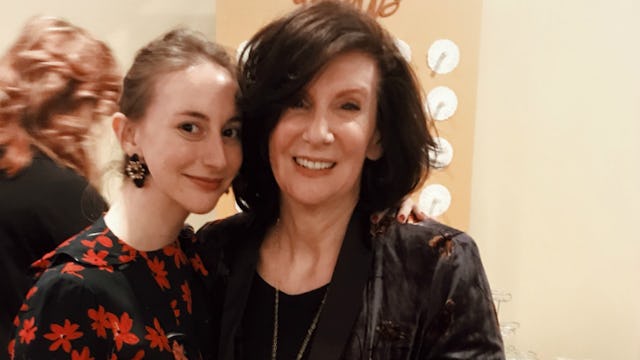How A Vacation Alone With My Grown Daughter Changed My Life

“Elizabethan,” I murmured, staring into the eyes of my newborn daughter, as perfect as an English rose. How prophetic a nickname, for she grew to be consumed by England’s history, perhaps in a nod to her grandmother’s heritage, or because her father’s historical brain is as firmly implanted within her as my own media mind.
“Let’s take a trip to London—just you and me,” Elizabeth said twenty-two years later. We didn’t know how profound an idea it was then, but the journey she conceived would transform my life and her own as well.
As I stood staring at portraits of remarkable eighteenth century European women—novelists, playwrights, painters, musicians, actresses, abolitionists, and Bluestockings, I imagined my own unique, incredibly beautiful mother descended from trailblazing women like these. A woman I had lost 22 years before but who still had a powerful hold on me.
Then, like a bolt, creative inspiration hit—I had to discover their life lessons and commonalities and write a book about my mother, one that would reconcile her unconventionality and all that had been withheld between us.
Through serendipitous twists and turns spanning years, that memoir—Saturday’s Child—is now being published in April. And, in addition to freeing me from family secrets that held me back, it has enabled me to trade an old story for a new one. Once a Chief Innovation Officer and brand consultant, I now live the creative life of a writer, one who also helps other women reinvent.
Elizabeth and I always had a pattern, a habit actually, of going off together. The middle child with an older and younger brother, our getaways were our time. Many were focused around shopping, but just as many were explorations. When she was young, I was Elizabeth’s awakener to the world.
But as she grew into an adult, it all got more complicated—we no longer lived together and her own separate life was full of intense demands. But whenever we squeezed in time to be together and experience something new, a little bit of magic always happened.
From the second they are born, we all learn from our children. But as an adult, I began to realize that my daughter was now meant to be my awakener. What if she had not conceived of the trip to London? What if she had never introduced me to her passions? She was the spark, and without her the book would never have been written.
It’s not always easy when power shifts between the generations, and I can only hope that I still open my daughter’s eyes to a thing or two or three. But she is a key player in the three-dimensional story of my mother, myself, and her—maybe even the most important one. Every great story has a “trickster” to completely break the cycle, right wrongs, and bring change so there can be transformation. And that person, I now know, is my adult daughter. No other relationship has such nuance as the mother-daughter bond. We sense; we know.
The continuum of shared knowledge between daughters, mothers, and grandmothers has always existed. But now, regular “Red Tent” rituals are few in today’s rushed, fragmented, tech-driven world. So, she and I make a point to regularly convene anytime we can, usually at The Metropolitan Museum of Art. Perched high on Fifth Avenue, its enormous span of four city blocks and beaux-arts façade make it feel almost holy; a columned relic that inspires quiet thanks for all that is curated within—everything anyone could ever hope to see in a lifetime.
Since London, I approach every experience we share together with a tingly anticipation, especially when they take us out of our element and make us think and feel. What will inspire us today? At The Met, we swerve around Greek and Roman statues thousands of years old, circling the enormous chipped bodies, catching each other, smiling when we’re both drawn to the same thing, raising brows when we both eye the same eccentric visitor.
There’s an invisible, extra-long umbilical cord that is now purposely slack—because it must be so—but one that can pull us closer when either gives a tug. We understand one another in a way that no one else could hope to. There is no need for magical thinking between us because we are enough, there is only a need for our magical moments of discovery to go on and on and on.
This article was originally published on